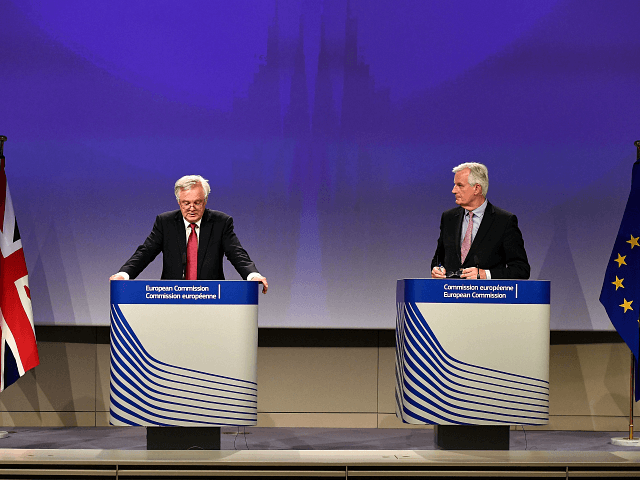BRUSSELS (AP) – Britain and a frustrated European Union hesitantly edged forward during their first full divorce negotiation session this week, though it became clear Thursday that one of the biggest stumbling blocks will be agreeing which court will have the final say in settling legal disputes after Brexit.
The EU’s chief Brexit negotiator, Michel Barnier, urged Britain to flesh out its positions on a variety of issues that need to be dealt with before discussions on a wide-ranging trade deal to follow the country’s exit from the bloc can begin.
He asked for a clear British plan on how much it should pay, the rights of citizens living in each other’s nations and how to keep make sure that the handling of the land border with Ireland doesn’t negatively impact on business and on the Northern Ireland peace process.
“This week’s experience has shown, we make better progress when our respective positions are clear,” Barnier said, in a comment that highlighted the bloc’s impatience with the British foot-dragging to start discussions following the June 2016 referendum that backed Brexit.
One major barrier is how much Britain will pay to meet its obligations as part of any Brexit deal. Estimates have ranged from around 40 billion euros ($34 billion) and 100 billion. Foreign Secretary Boris Johnson has said the EU can “go whistle” for its money if it comes with excessive demands.
“Accounts have to be settled,” Barnier countered.
Barnier said during a joint news conference that the “clarification of the UK position is indispensable for us to negotiate and for us to make sufficient progress on this financial dossier which is inseparable from other dossiers.”
British negotiators – 99 of them arrived on Monday – have been pushing back against EU allegations that they were ill-prepared, insisting they needed less public paperwork since they did not have to report back to 27 nations.
Britain’s Brexit minister David Davis said that four days of talks among dozens of negotiators had provided “a lot to be positive about.”
Davis said he’s “encouraged by progress” on key issues, even though negotiators barely moved beyond exploratory issues during talks that are expected to stretch into late 2018.
One problem stood out, though. The EU wants its top court, the European Court of Justice, still to be the final arbiter on many issues in the wake of the Brexit agreement, which Britain rejects.
The court was a key issue during the 2016 referendum campaign, with ‘leave’ campaigners arguing that the primary role of the European court over national courts represented a substantial loss of sovereignty.
Barnier insisted the ECJ still needs a strong role.
“Quite frankly,” he said, “any reference to European rights imply their oversight by the Court of Justice of the European Union.”
It leaves the negotiators with plenty of work for the rest of the summer and early fall. Since the talks have taken four months to fully kick off, negotiators will now be pressed to make up lost time on a host of wickedly complicated issues which could take years, if comparable international examples like trade agreements are any guide.
While the official deadline is March 2019, there’s a practical deadline of late Autumn next year, since any agreement would still face ratification in the EU and its nations.
By October this year, they will be looking for agreement on “sufficient progress” on the rights of citizens living in each other’s nations, the bill Britain will have to pay, the border issue in Ireland and the place of the European Court of Justice as an ultimate arbiter. Once enough progress has been made on all these issues, both sides can also start looking at building a new trade and political relationship.
Davis held out hope Britain and the EU would remain the best of allies and that any settlement should not seek an edge on an opponent.
“Nobody expects a punishment deal. Michel and I are both going for a good deal,” Davis said.

COMMENTS
Please let us know if you're having issues with commenting.